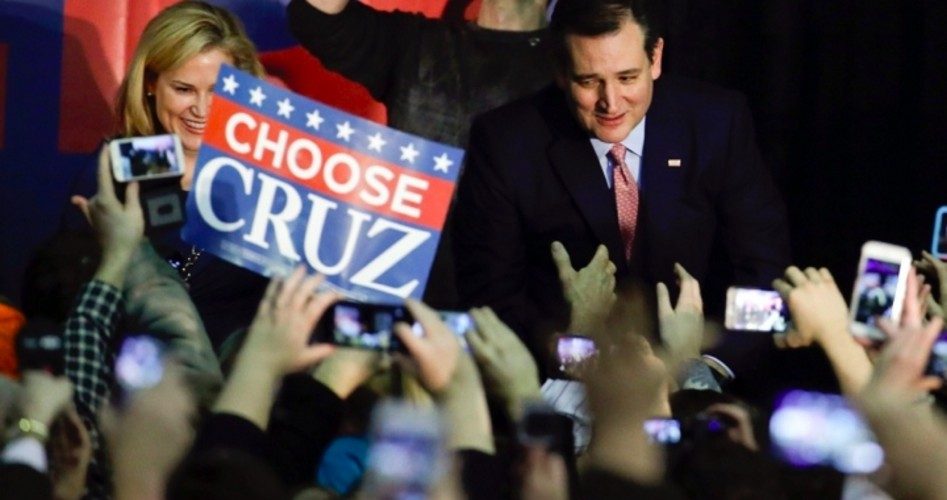
COUNCIL BLUFFS, IOWA — When Iowa voters went to the caucuses Monday evening, they showed their dissatisfaction with establishment politicians, and not just those on the Republican side. Vermont Senator Bernie Sanders surprised Hillary Clinton with a near dead heat on the Democrat side, and there’s some controversy over whether Hillary actually did edge out Bernie. Sanders, who leads his followers chanting “Enough is enough!” attracts those who have given up on the political process. While constitutional conservatives find themselves at odds with Sanders’ socialist fixes, the unmistakable fact is that his surprise of Hillary in Iowa was based on voter dissatisfaction, even among Democrats.
The Republican side was dominated by candidates courting voters with anti-establishment positions. Ted Cruz has promised to “Rein in Washington,” including his Five for Freedom Plan that would eliminate the IRS and the departments of Education, Energy, Commerce, and Housing and Urban Development. Donald Trump, who finished not far behind Cruz, is running an anti-establishment campaign as he courts fed-up voters with his stands on immigration, ObamaCare repeal, and making drastic changes in the Department of Veterans Affairs. And the list goes on.
Flip-Flops of the Past
Despite strong voter sentiments in the past for change, such changes have been rare. Any attempt to compile a comprehensive list of candidates’ broken promises once they were elected would take volumes, but here are a few.
Let’s start with candidate Jimmy Carter, whose anti-establishment rhetoric was followed by a flip-flop once he gained the White House, as was noted in this publication on July 23, 2009:
When Jimmy Carter ran for president, he said: “The people of this country know from bitter experience that we are not going to get … changes merely by shifting around the same group of insiders.” And top Carter aide Hamilton Jordan promised: “If, after the inauguration, you find a Cy Vance as secretary of state and Zbigniew Brzezinski as head of national security, then I would say we failed. And I’d quit.” Yet Carter selected Vance as secretary of state and Brzezinski as National security adviser; the “same group of insiders” had been shifted around; and Jordan did not quit.
In 1988 presidential candidate George H.W. Bush promised, “Read my lips. No new taxes.” Once in office, however, Bush agreed to a compromise which increased several existing taxes as part of a 1990 budget agreement.
In 2008 presidential candidate Barack Obama campaigned on “Hope and Change.” Once in office, however, he made appointments largely from the same group of Washington, D.C. insiders.
Voters may have a similar unpleasant surprise with candidate Ted Cruz if he is elected. Joe Wolverton’s October 15, 2015 article in this publication entitled “Ted Cruz’s Closest Counsellors Are Neocon CFR VIPs” lists among those counsellors Chad Sweet, Victoria Coates, James Woolsey, and Elliott Abrams.
Will The Establishment Take One on the Chin or Take It with a Grin?
Many American voters make two major mistakes. The first is that they focus too heavily on the presidential contests and forget that Congress is the key to what the federal government does or doesn’t do. The second is that once they vote for a candidate, they say, “Let’s see what he can do” when they should be saying, “Let’s make him do what he promised.”
ObamaCare repeal is a prime example of betrayal. The American people were incensed by the enactment of the president’s socialist healthcare legislation, and the drive to repeal it was a prime factor in fueling the Tea Party movement. It was also a major issue for Republican candidates when requesting donations and asking for votes. Now, safely in office, those same Republican senators and congressmen are pretending to be powerless to repeal ObamaCare and are dishing out excuses.
Will the establishment take it on the chin, or will they take it with a grin? An educated and activated electorate can accomplish the former. Voters who like glitzy entertainment instead of factual news and take the “Let’s see what he does now that he’s in office” attitude will be dealt the latter.
Photo: AP Images


